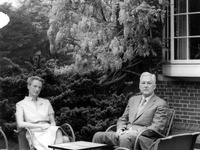After he left the Mellon Foundation, Pusey turned his attention to religious and mental health initiatives.
He remained active in the Episcopal church, serving as a member of the Central Committee of the World Council of Churches and the president of the United Board for Christian Higher Education in Asia.
He also worked extensively with Fountain House, a New York chairty that provides counseling, employment and housing for the mentally ill.
But even after he left Harvard, Pusey’s influence lingered.
Bok described Pusey as an “unfailingly kind and supportive” predecessor, citing his willingness to offer advice to his successor.
“Behind the official, he was an enormously kind and decent and unpretentious human being,” he said. “Whether one agreed with him or not, he was a man of great integrity.”
Pusey was in good health when he last returned to Harvard for Commencement exercises in June, where all four living presidents were present.
His health began to decline in recent weeks, University spokesperson Rebecca Rollins said.
Memorial services will be held sometime during the next few days at St. James Church in New York, she said.
Pusey is survived by his wife, Anne Woodward Pusey, two sons, Nathan M. Pusey Jr. and James R. Pusey, and a daughter, Rosemary Hopkins.
“He was a superior human being,” said Pusey’s wife yesterday. “He was totally devoted to Harvard in every way he could have been.”









